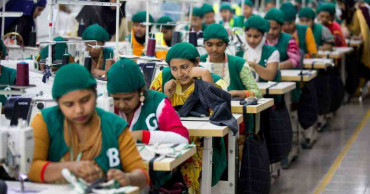TRIPS
Covid vaccine: Temporary waiver sought on TRIPS
A temporary waiver of the Trade Related Aspects of Intellectual Property Rights (TRIPS) Agreement for the COVID-19 vaccine is essential to meet the number of doses of vaccinations required to achieve global herd immunity, according to a joint article.
Parsa Erfani, Agnes Binagwaho, Mohamed Juldeh Jalloh, Prof Muhammad Yunus, Paul Farmer, and Vanessa Kerry have written the article published in the British Medical Journal recently.
The titled of the article is "Intellectual property waiver for covid-19 vaccines will advance global health equity" thst focused on the importance of a temporary IP waiver to reach global needs, said the Yunus Centre on Monday.
Also read: Bangladesh seeks TRIPS waiver to ramp up Covid vaccine production
The article stated the current vaccination figures show that the percentages of people in high income countries who have been vaccinated is 46% while 20% in middle income countries and 0.9% in low income countries.
This is largely due to acquisition of doses by high income countries in large quantities as well as production being restricted to a small number of manufacturers, it reads.
The article states that a clear scarcity of supply exists, and this exists due to intellectual property (IP) protection which currently restricts production and access to the vaccines.
Donor based models have not worked in reaching the highest risk population, due to underfunding and vaccine scarcity, said the Yunus Centre quoting the article.
To meet the current global needs it is necessary to also have production of vaccines in LMICs, it said.
A temporary waiver, will enable more manufacturers and result in yielding doses faster, according to the article.
Also read: Next 2 weeks crucial to ensure TRIPS waiver for pharma beyond LDC graduation
The arguments against the waiver include, that LMICs have limited capacity to produce such complex vaccines, that a move like this could stifle further biomedical innovation and funding into such research, as there would be no return on investment and cause bottlenecks in the supply chain. However, data does not support this.
Sharing of the technology and the technical know how is crucial in helping to expand production to meet global needs, according to the article.
There are LMICs who have production capacity for complex COVID-19 vaccine production. With the IP waiver, and sharing of all vaccine related knowledge and technology as well as planning, bottlenecks in raw materials can be avoided.
The waiver would be temporary thus only affecting the COVID-19 vaccine, and many of the costs of research and development have been recouped.
There has also been publicly funded research which laid the ground work for the vaccine. Keeping all things in mind, this seems to be the best way forward in meeting global needs.
Now, it is important that countries need to agree on a temporary IP waiver, in order to ensure the world's population can receive the vaccinations, achieving global herd immunity and facilitating global health equity.
4 years ago
Continuation of drugs patent waiver for Bangladesh can help others
The World Trade Organization (WTO) should continue drugs patent waiver for Bangladesh as the country graduates from the club of least developed countries (LDC) in 2024.
As an LDC, Bangladesh is enjoying exemption from the patent rights and conditions set by the WTO Agreement on Trade-Related Aspects of Intellectual Property Rights (TRIPS).
Read: WTO to start Covid-19 vaccine supply negotiations amid clash on patents
After 2024, the country will need to comply with TRIPS. However, the extension of the TRIPS waiver for Bangladesh will directly benefit developed countries along with other LDCs and developing countries as they will be able to import low-cost medicines from here.
Experts said this at the "Emerging Issues in Access to Treatment for Covid-19 in Bangladesh" jointly organised by Equity BD, People's Health Movement Bangladesh and the Third World Network.
Read: More support easing vaccine patent rules, but hurdles remain
KM Gopakumar, senior researcher and legal advisor at the Third World Network, said: "People in developing countries and LDCs need access to vaccines and other health products to survive the pandemic, which requires widespread availability of these health products."
"TRIPS waiver offers the policy space to do away with the IP monopoly and facilitate the scaling up or production through diversification of the manufacturing base. Also, there is an urgent need to negotiate a smooth transition period for graduating LDCs to address concerns on matters affecting peoples' health," he added.
4 years ago
Next 2 weeks crucial to ensure TRIPS waiver for pharma beyond LDC graduation
Noted economist Dr Debapriya Bhattacharya on Saturday said the next two weeks is very crucial for Bangladesh ahead of the General Council meeting of the World Trade Organisation (WTO) to negotiate to continue enjoying pharmaceutical waivers beyond the LDC graduation in 2026 under the Agreement on Trade-Related Aspects of Intellectual Property Rights (TRIPS).
Currently there is a proposal asking the pharmaceutical waiver for an additional 12 years period for the LDCs in their post-graduation phase. The issue is an agenda item for the next meeting of the WTO general council to be held on July 26-27, he said.
“The next two weeks is very important for Bangladesh if it wants to continue getting the pharmaceutical waivers under TRIPS (a legal agreement between all the member nations of WTO) ….Bangladesh –in view of the upcoming WTO General Council meeting—needs to mount a robust negotiating effort and demonstrate necessary political initiative mobilizing all political assets and negotiation power,” said the public policy analyst.
Dr Bhattacharya, also former Bangladesh ambassador to WTO, made the remarks at a virtual press conference.
Explaining the political initiative, he said the Bangladesh mission in Geneva undoubtedly plays its role there. But it is not enough.
Also read: Dhaka-Beijing ties can be prime mover for Bangladesh’s transformation: Debapriya
“The issue is much more related to political affairs rather than a matter of negotiation. So, a political effort is very important here,” he said, adding that Bangladesh needs to raise its logical stance before its development partners and trade partners through its diplomats stationed in major countries – Washington, Brussels, London and Tokyo.
Dr Bhattacharya, a distinguished fellow of Centre for Policy Dialogue (CPD), said the next WTO general council meeting may not reach the final decision over the extension of pharmaceutical waiver. So, Bangladesh may need to continue the negotiating effort until the 12th WTO ministerial conference to be held on November 30 to December 30, 2021 in Geneva, where the final decision over the issue can be seen, he said.
If Bangladesh does not get the post-graduation facility of the pharmaceutical waiver under TRIPS Agreement, it will affect the country’s pharmaceutical industries particularly the small enterprises, increase the prices of drug and enhance the health-related cost of the people, he said.
Besides, Bangladesh, beyond the LDC group, should make the country-specific approach to trading and development partners to continue enjoying the facilities beyond its graduation as did Maldives, said the renowned economist adding that Maldives could continue getting such facilities even after its graduation from the LDC.
“Bangladesh will have to take its own stance beyond the LDCs group and I meant to make a country-specific approach. It is possible inside the WTO. All the LDCs might not get the facility. Rather some selected countries could get it. It may happen in the WTO,” he said.
Also read: Protect consumption, promote employment in next budget: Debapriya
There are currently seven graduating LDCs including Bangladesh among 35 LDC members of WTO.
Dr Bhattacharya stressed the need for keeping the intellectual property right (IPR) issue in the midst of the country’s transitional strategy and LDC graduation discourse to face the changes Bangladesh is witnessing in the IPR.
He mentioned that the WTO’s TRIPS council on June 29, 2021 agreed to extend the LDC transition period by another 13 years. The TRIPS under its Article-66.1 has provided the transitional period for implementation of the commitments by the LDCs since 1995, but the provision expired on July 1, 2021.
Though Chad placed the extension proposal on behalf of the LDC group in the WTO, a large number of member-states went on record to appreciate the constructive role played by the Bangladesh delegation in this regard.
4 years ago
TRIPS transition period for LDCs extended by 13 years
The transition period of the Trade-Related Aspects of Intellectual Property Rights (TRIPS) for theLDCs has been extended by another 13 years.
Md. Mustafizur Rahman, Ambassador and Permanent Representative of Bangladesh in Geneva said the negotiation was not smooth at all and the developed countries - particularly, the US and the European Union were not agreeable to such a long transition period.
Read: Bangladesh to seek LDC benefits for 5 years after graduation
“This special transition period will remain in force till 1 July 2034. With this achievement, we’re delighted,” he said.
After a long and intense negotiation among the members of the World Trade Organisation (WTO), a proposal in this regard has been adopted by consensus in the TRIPS Council.
Bangladesh played a leadership role in this negotiation on behalf of the Least Developed Countries (LDCs), said the Bangladesh Permanent Mission in Geneva on Wednesday.
This is the longest extension up till now. Mentionable, earlier there were such extensions for periods of seven and eight years.
The Ambassador said Bangladesh is soon going to graduate from the list of the LDCs. “Despite that, we were inclined to find a long term transition period for the LDCs so that they don’t need to sit for negotiation frequently.”
Read:Work together to tackle negative impacts after LDC graduation
Bangladesh has been playing a leadership role on behalf of the LDCs in various international negotiations.
Currently, another proposal with regard to LDC graduation is under consideration in the General Council of WTO.
Bangladesh is also leading the LDCs in this negotiation.
At present Chad of Africa is playing the role of Coordinator in the organization but on the matters of trade and intellectual property rights, Bangladesh is leading the negotiations in the WTO.
4 years ago


.jpg)


